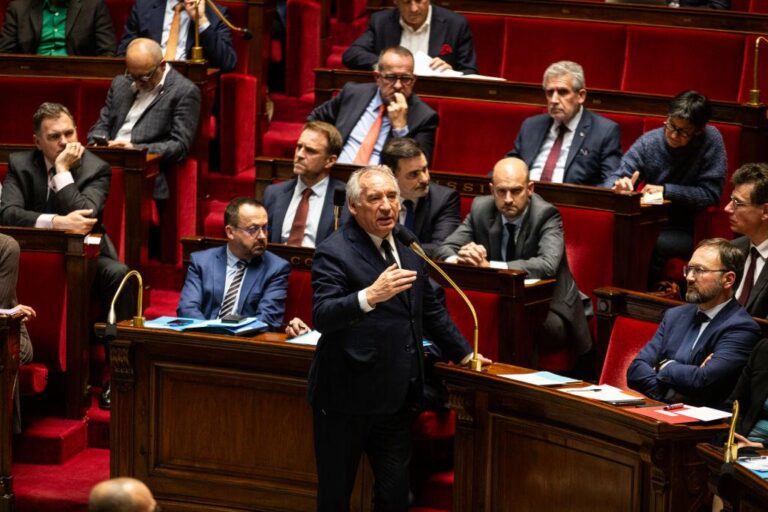Introduction
As France approaches a pivotal budget vote, the future of the government hangs in a delicate balance, reflecting growing political tensions and economic uncertainties. With rising public dissent and concerns over fiscal policies, lawmakers are bracing for a critical showdown that could redefine the nationŌĆÖs economic landscape. The outcome of this vote not only has significant implications for President Emmanuel Macron’s administration but also for the broader stability of France’s political climate. As debates intensify in the Assembly, all eyes are on whether the government can secure the necessary support to pass its budget and navigate the challenges that lie ahead.
French Government Faces Key Challenges as Budget Vote Approaches
As the French government gears up for a critical budget vote, it is confronted with a series of pressing challenges that could significantly impact its future stability. Economic concerns, particularly rising inflation and energy costs, have left many citizens feeling the pinch. This has led to widespread public discontent, sparking numerous protests that have drawn attention to the governmentŌĆÖs handling of fiscal policy. Additionally, the coalitionŌĆÖs fractured alliances in the National Assembly complicate the passage of the budget, with dissenting voices emerging from both left and right factions.
Key elements of the upcoming budget include:
- Social Welfare: Proposals to increase benefits for low-income families are under scrutiny.
- Public Investment: Plans for infrastructure development face cuts amid fiscal tightening.
- Tax Reforms: Discussions around altering corporate tax rates have sparked debate within the ruling coalition.
| Challenge | Potential Impact |
|---|---|
| Inflation | Increased public discontent and risk of social unrest |
| Coalition Fragility | Difficulty in passing legislation, instability in governance |
| Debt Levels | Pressure on public spending and investment strategies |
Potential Impacts of Budget Decisions on Economic Stability
The upcoming budget vote holds significant implications for the French economy, potentially steering the nation toward either stability or volatility. As the government grapples with growing demands for social programs amidst rising inflation, the choices made in the budgetary process will be crucial. Key areas of focus include:
- Public Spending: Increased expenditure could support essential services but may also inflate the deficit.
- Taxation Policies: Adjustments in tax rates will impact both consumer spending and business investments.
- Debt Management: Strategies to address national debt levels will be critical in preserving investor confidence.
The potential economic repercussions of these budget decisions could ripple through various sectors, affecting employment rates and overall consumer confidence. Stakeholders are particularly concerned about maintaining a delicate balance between fiscal responsibility and social welfare. A recent survey highlights the public’s anxiety over economic conditions, with findings indicating that 77% of citizens fear that budget cuts will undermine job security. Additionally, economic analysts warn that missteps in the budget could lead to:
| Potential Impact | Example |
|---|---|
| Increased Unemployment | Reduction in public sector jobs |
| Inflationary Pressure | Higher costs for consumers |
| Investment Flight | Businesses relocating |
Political Alliances and Their Role in Shaping Fiscal Policy
In the lead-up to the critical budget vote, the French government faces significant pressure from various political alliances that could dictate the future of its fiscal policy. Tensions within the ruling coalition have amplified concerns, as the need for a cohesive strategy to address budgetary constraints clashes with differing party agendas. Key players in this drama include traditional parties, emerging movements, and independent factions, each vying for influence over spending priorities and taxation. The stakes are high, as disagreements could lead to a failure to pass the budget, resulting in prolonged political instability.
As the government navigates these waters, the role of alliances becomes paramount. Political coalitions not only influence legislative outcomes but also shape public sentiment regarding fiscal responsibility. Current discussions center around crucial issues, such as:
- Social Welfare Programs: Balancing support for vulnerable populations against economic sustainability.
- Tax Reforms: Proposals to adjust tax rates could divide parties sharply, reflecting broader ideological divides.
- Public Investments: Prioritizing infrastructure versus austerity measures to stabilize finances.
In these turbulent times, collaboration might emerge as a necessary evil; yet, it is fraught with implications for FranceŌĆÖs economic trajectory. The government’s capacity to negotiate and establish a unified front will be tested, as any failure to form effective alliances risks derailing essential fiscal measures.
Recommendations for Ensuring Cohesion and Confidence in Governance
To cultivate a sustainable governance model, it’s imperative for the French government to prioritize transparency and communication. Establishing regular forums for public discourse will not only enhance civic engagement but also serve as a check on government actions. By fostering a culture where citizens feel their voices are heard, policymakers can increase public confidence and ensure a collective approach to national issues. Furthermore, leveraging digital platforms for real-time feedback can significantly boost responsiveness, allowing for adjustments in governance as challenges arise.
Moreover, a structured approach to cross-party collaboration is vital for promoting stability. Initiating dialogue among various factions can break the current partisan deadlocks and facilitate the passage of essential legislation, particularly with regard to the upcoming budget vote. Key strategies may include:
- Organizing bipartisan committees to tackle specific issues.
- Hosting regular roundtable discussions between party leaders.
- Encouraging joint public statements to present a united front on critical policies.
| Strategy | Potential Benefits |
|---|---|
| Bipartisan Committees | Enhanced mutual understanding and cooperative policy-making. |
| Roundtable Discussions | Fostering trust and reducing misunderstandings. |
| Joint Public Statements | Strengthened public perception of government unity. |
In Summary
As the French government braces for a pivotal budget vote, the uncertainty surrounding its future looms larger than ever. With internal divisions and widespread public discontent, the outcome of this vote could define the trajectory of President Emmanuel MacronŌĆÖs administration. Analysts suggest that the results will not only impact fiscal policies but also shape the political landscape in France, potentially influencing broader European dynamics. As stakeholders await the unfolding of events, the resilience of the government and its ability to navigate these challenges will be closely scrutinized. With the stakes higher than ever, all eyes will be on the National Assembly in the coming days. Stay tuned for further developments as we continue to cover this evolving story.




